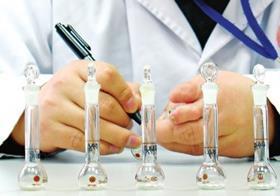
Indian laboratories have proven their competence levels in residue analysis are more than a match for their European counterparts in a recent ring-test conducted by the country’s National Referral Laboratory (NRC).
The NRC, which is based in Pune, has conducted proficiency testing and ring-test programmes to evaluate the performance of laboratories for the 2011 Indian table grape season. In the ring-test, which took place in February, 11 Indian laboratories engaged in residue testing alongside three European laboratories – AgriQ Group BV (The Netherlands), Dr Specht Express (Germany) and QTS Analytical (UK).
According to Indian export agency APEDA, the tests were conducted targeting 171 chemicals, including pesticides, growth hormones and heavy metals, and each laboratory was assigned a unique code number to maintain confidentiality. Grape juice spiked with certain chemicals (but unknown to the laboratories) was used as the test material and samples were issued to each laboratory. The laboratories were asked to identify and quantify the residues present in the test material and forward their results to the NRL within a week.
Having collated and processed all the results, NCR found that all 14 participating laboratories passed the test in residue detection. In a public statement, APEDA said it was pleased to announce that the performance of the Indian laboratories was rated as ‘equivalent to better’ than that of the European laboratories.
“These findings give us good confidence to state that Indian laboratories are in no way inferior to laboratories in Europe,” APEDA director Sanjay Dave told Fruitnet.com. “Unfortunately, most importers, traders and supermarkets don’t realise the competence level of our laboratories and we hope that the results of this test will help to raise their awareness.”
The Indian grape trade will also be hoping that the results help to cut out some of the duplication that is currently occurring in the residue testing process on shipments to Europe. Indeed, lack of trust in the competency of Indian laboratories among some EU buyers and government agencies have resulted in a significant amount of re-testing to verify Indian laboratory results. But industry sources say that this is adding to the cost of residue testing, which has already increased substantially this year with the expansion of APEDA’s residue monitoring programme following last year’s issues with Chlormequat Chloride Component.



